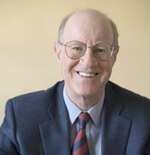William Damon
| William Damon | |
|---|---|
 |
|
| Born | Brockton, Massachusetts |
| Nationality | American |
| Fields | Psychology, Education |
| Institutions | Stanford University |
| Alma mater | Harvard University |
| Known for | Writings on moral commitment, purpose |
| Influences | Erik Erikson, Jean Piaget, Emile Durkheim, William James |
William Damon (born in Brockton, Massachusetts) is a Professor of Education at the Stanford Graduate School of Education, Director of the Stanford Center on Adolescence, and senior fellow at Stanford University's Hoover Institution on War, Revolution, and Peace. He is one of the world's leading researchers on the development of purpose in life and the author of the widely influential book The Path to Purpose. Damon also helped develop innovative educational methods such as peer collaboration, project-based learning, and the youth charter. His current work includes a scientific study that explores the development of purpose and other psychological capacities and a study of how people find new purposes later in life. Dr. Damon writes on intellectual and social development through the lifespan. He is the founding editor of New Directions for Child and Adolescent Development and editor-in-chief of The Handbook of Child Psychology (1998 and 2006 editions). Damon has been elected to the National Academy of Education and the American Academy of Arts and Sciences.
Damon grew up in Brockton, Massachusetts and attended public schools there. His mother Helen was a shoe designer. His father Philip served in the army during World War II and did not return from the war. Damon moved in with his mother's uncle, who helped raised him and sent him to college.
After college, Damon received a doctorate in psychology at the University of California. He then joined the psychology faculty at Clark University as an assistant professor. In the 1990's he was University Professor at Brown, where he founded the Center for the Study of Human Development. In the 1990's Damon also did part-time work with television and film studios to develop educational content for shows such as Ghost Writer and The Big Bag.
Damon is the author of 18 books and numerous book chapters and articles on education and human development. His work has been influential for research and theory in academic developmental psychology and in the broader society, especially around questions of childrearing and schooling that supports children’s social development. Damon’s editorship of the 5th and 6th editions of the Handbook of Child Psychology places him–along with Carl Murchison, Leonard Carmichael, and Paul Mussen–as one of the great organizers and synthesizers of developmental science. As part of Damon’s commitment to the study of human growth, he also was the founder and long-term editor of the series New Directions for Child and Adolescent Development.
...
Wikipedia
